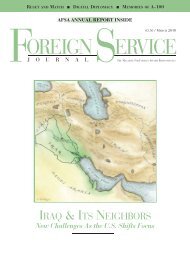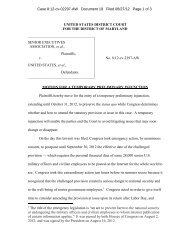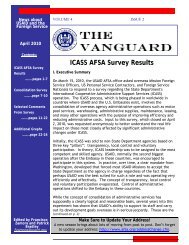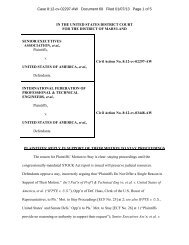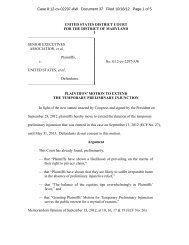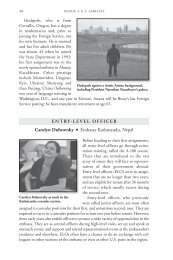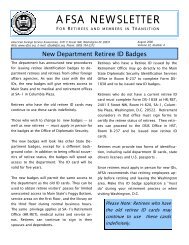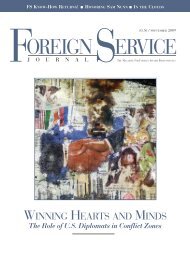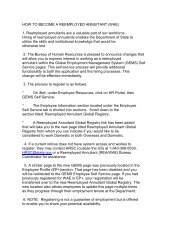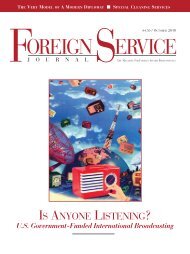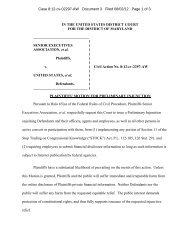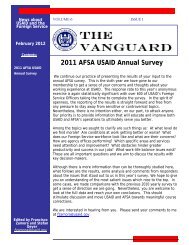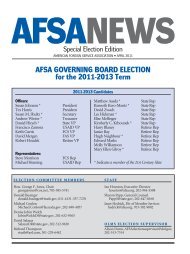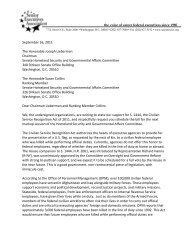F OCUS - American Foreign Service Association
F OCUS - American Foreign Service Association
F OCUS - American Foreign Service Association
Create successful ePaper yourself
Turn your PDF publications into a flip-book with our unique Google optimized e-Paper software.
Seven months ago, I was living in<br />
a barrio of Caracas, on top of the<br />
last green hill in the city. I was<br />
living in what any outside observer<br />
would call the slums: the water comes<br />
just two days a week, the kids play<br />
baseball in the street with bottle caps,<br />
families live three generations to a<br />
concrete room, and salsa and techno<br />
versions of 1980s <strong>American</strong> rock<br />
songs blare from every house at every<br />
hour of every day.<br />
Embassy Caracas also sits on top<br />
of a hill. It is on the opposite side of<br />
the city, however, in the richest neighborhood<br />
in Caracas. Before this trip,<br />
I had done most of my traveling with<br />
the advantage (or so I thought) of a<br />
diplomatic passport. With a father<br />
who works for USAID, I was raised<br />
overseas with an interest in international<br />
development and a consciousness<br />
of other cultures. This time,<br />
however, I realized that while a diplomatic<br />
passport may get one through<br />
lines more quickly, it also tends to<br />
keep its bearer separated from the<br />
people and realities they are there to<br />
understand.<br />
The gulf between our two mountaintops<br />
was real. In a brief visit to the<br />
embassy, I met with a friend of my<br />
father. It was a week before last December’s<br />
referendum on constitutional<br />
reforms, and I had been immersed in<br />
reading and debating the proposals<br />
with local friends at the bodega. I was<br />
unprepared for how completely our<br />
two perspectives clashed.<br />
92 FOREIGN SERVICE JOURNAL/JULY-AUGUST 2008<br />
REFLECTIONS<br />
On a Hilltop in Venezuela<br />
BY AMANDA ECKERSON<br />
The only thing I knew<br />
for certain was that<br />
my father’s friend had<br />
never been to my hilltop,<br />
and no one I was living<br />
with could afford the<br />
taxi required to climb<br />
the hill to his.<br />
<br />
My father’s friend was against the<br />
reforms because they were undemocratic;<br />
I was for them because they<br />
were democratic. He believed most<br />
Venezuelans hated Chavez; I hadn’t<br />
met one who didn’t support him. He<br />
believed the milk shortage that preceded<br />
the election was the fault of the<br />
government controlling vital substances;<br />
I had been told that powdered<br />
milk was controlled by the oligarchy,<br />
and ran out before every<br />
major vote or election to make people<br />
uneasy.<br />
The only thing I knew for certain<br />
after our conversation was that my<br />
father’s friend had never been to my<br />
hilltop, and no one I was living with<br />
could afford the taxi required to climb<br />
to his. The disparities in our facts and<br />
our opinions were vast, and I wondered<br />
where the truth lay.<br />
I was acutely aware that there were<br />
dangerous misconceptions on both<br />
sides. I felt, however, that if <strong>American</strong>s<br />
could see and hear the things<br />
Venezuelans are fighting for when<br />
they back Chavez, they would find<br />
them eerily familiar. Venezuelans<br />
want the dignity and respect of being<br />
a sovereign nation. They want jobs,<br />
access to health care and the pride of<br />
a strong military. They want things<br />
that we want ourselves and should<br />
therefore be supporting in other<br />
nations as they develop — even if they<br />
sometimes look different than ours.<br />
Observing America from the other<br />
hilltop was sobering. Like our<br />
embassy, it was isolated, not welcoming,<br />
and catered only to those with the<br />
money and means to reach it. If elitism<br />
is what our foreign policy is striving<br />
to convey, then it is perfectly positioned.<br />
I couldn’t help thinking, however,<br />
that in terms of our national<br />
interest, and our cherished <strong>American</strong><br />
ideals, we should be forming longterm,<br />
sustainable ties with people and<br />
nations based on shared values.<br />
If we want to understand the common<br />
bonds we share with Venezuelans,<br />
we don’t need to move mountains.<br />
Only mountaintops. ■<br />
Amanda Eckerson graduated with a<br />
B.A. in history from Yale University<br />
in 2007. She grew up in Haiti and<br />
Ethiopia, and will be returning to<br />
Venezuela on a Fulbright Scholarship<br />
next year to research the use of performance<br />
in political struggles in<br />
Caracas.



